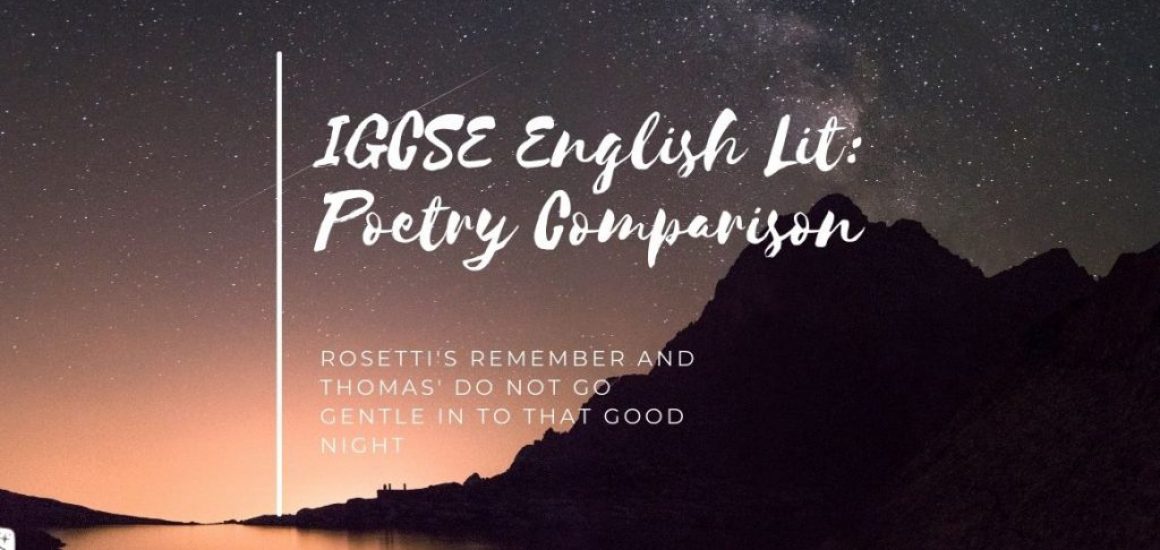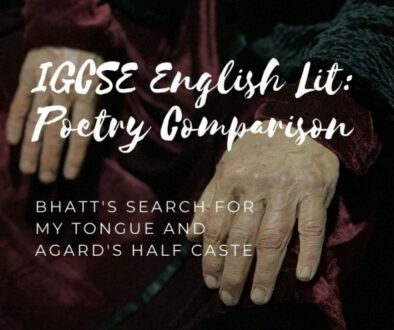IGCSE English Lit: Poetry Comparison – Rosetti’s Remember and Thomas’ Do not go gentle in to that good night
Question: In Remember and Do Not Go Gentle Into That Good Night the poets present contrasting attitudes to death. Compare the different ways the poets present these attitudes making reference to their attitude and other poetic devices.
Remember
Christina Rossetti (1830-1894)
Remember me when I am gone away,
Gone far away in to the silent land;
When you can no more hold me by the hand,
Nor I half turn to go yet turning stay.
Remember me when no more day by day
You tell me of our future that you planned;
Only remember me; you understand
It will be late to counsel then or pray
Yet if You should forget me for a while
And afterward remember, do not grieve;
For if the darkness and corruption leave
A vestige of the thoughts that once I had,
Better by far you should forget and smile
Than that you should remember and be sad.
Do not go gentle in to that good night
Dylan Thomas (1914-1953)
Do not go gentle in to that good night,
Old age should burn and rave at close of day;
Rage, rage against the dying of the light.
Though wise men at their end know dar is right,
Because their words had forked no lightning they
They do not go gentle in to that good night.
Good men, the last wave by, crying how bright
Their frail deed might have danced in a green bay,
Rage rage against the dying of the light.
Wild men who caught and sang the sun in flight,
And learn, too late, they grieved it on its way,
Do not go gentle in to that good night.
Grave men, near death, who see with blinding sight
Blind eyes could blaze like meteors and be gay
Rage, rage against the dying of the light.
And you, my father, there on the sad height
Curse, bless, me now with your fierce tears, I pray.
Do not go gentle in to that good night
Rage, rage against the dying of the light.
Both poems Do Not Go Gentle Into That Good Night by Dylan Thomas and Remember by Christina Rossetti have the on-going and underlying theme of death. However, they present contrasting attitudes evoking various emotions from the reader. I discuss how the poets achieve these effects in the following essay. (This essay will explore how the poets have achieved this effects.)
Do Not Go Gentle Into That Good Night describes the fight and ‘rage’ against death. It is not until the last stanza that we come to the realisation that Thomas was writing to his father, imploring him to fight against death and continue to work and leave a legacy. As a reader, from the start of the poem, we assume that the poem is a general message, almost a command to resist death, aimed at a wider audience.
Remember by Rossetti talks of the death of self, her, the poet’s death. We learn from the beginning that this is a message aimed towards the lover, acknowledging early on in the poem that the poet has a deep acceptance of death. This creates a loving and calm atmosphere through the poem. This contrasts the desperate need Thomas has for his father to ‘Rage, rage against the dying of the light’. In Remember, the poet hopes to be fondly remembered by their loved one. As opposed to Thomas who has an ongoing fear of losing his father.
The poem Thomas writes is a villanelle, a fixed form poem almost showing how death will ultimately be inevitable. The rigid ABA ABA ABA ABA ABA ABAA the last ABAA further enforcing the last two repeated lines ‘Do not go gentle in to that good night’ and ‘Rage, rage against the dying of the light’.
The closing couplet thus repeating the first and last line of the verse. Iambic pentameter sets the rhythm for the poem, the tight structure of the villanelle matches Thomas’ demanding command to resist death, as well as the general fighting all ‘men’ have in common.
The rhyme and rhythm for Remember deeply contrasts with that of Do not go gentle in to that good night. Rossetti has written in a petrarchan-sonnet form. There is an ABBA rhyme scheme used twice, but instead of using CDE twice, the pattern changed toe CDDECE. This is done to introduce the new idea of forgetting and being happy. The poet sacrifices their instructions and wants and prioritizes their lover’s happiness over their own desires. This is shown in the changing of the rhyme scheme. It changes the overall ‘emotions’ of the poem from the imperative fear and concern of being forgotten to a much more subtle, soothing love. Iambic pentameter is also used in this poem, however it ironically contrasts the lack of control in death and the unknown future.
This contrasts Thomas’ use of iambic pentameter where he uses and compares it to all the men who fight against death. Do not go gentle in to that good night opens strongly further reinforcing the title. There is a metaphorical irony the ‘good night’ being a euphemism for death. The fact you would want to resist the ‘good night’ implies that the good night would be the end of suffering. There is use of descriptive passionate, assonance and plosive sounds ‘burn and rave’. This evokes strong, bold imagery for the reader further describing how important it is for his father to ‘rage, rage against the dying of the light’.
In Remember, Rossetti open the poem with the title as the first word, much like Thomas. There is also a euphemism in the second line, the ‘silent land’ being a place of death. It is a peaceful lonely place where ‘you can no more hold me by the hand’. There is repetition of ‘remember me’ in the same sense as ‘do not go gentle in to the good night’ and ‘Rage, rage against the dying of the light’. These are all done to reinforce the idea of remembering and fighting against death.
There is a physical separation in Remember ‘when you can no more hold me by the hand’. The alliteration here show the loving, tenderness of their relationship. This is in contrast to ‘Do not go gentle in to the good night’ where the underlying, general separation of father and son triggers Thomas’ fear of his father dying.
Thomas goes on to state a variety of different men ‘wise men’, ’good men’, ‘wild men’ and ‘grave men’. Thus perhaps proving a point to his father. Describing how all men ‘do not go gentle in to that good night’ and ‘Rage rage against the dying of the light’. This compares to Rossetti who is accepting of death but fears not being remembered ‘Remember me’.
‘Nor, half turning to go yet turning to stay’ contrasts ‘good men’ whose ‘frail deeds might have danced in the green bay. This describes the unfulfilled potential and opportunities, much like the indecisiveness of ‘half turning’ to go yet turning to stay’.
The last two stanzas of Rossetti and Thomas’ poems are direct messages to their loved ones. Thomas further reinforces the point of desperation of fighting against death. Rossetti’s last verse is a turning point, describing how it is ‘Better by far to forget and smile’, than to ‘remember’ and be sad.
Both poems deal with themes of death. However, their perceptions and ideologies are very different. Rich and unique with descriptive and emotional elements, the poets have found their own ways in conveying their respective attitudes towards death.
Georgia-mae Tan
26 May 2020






